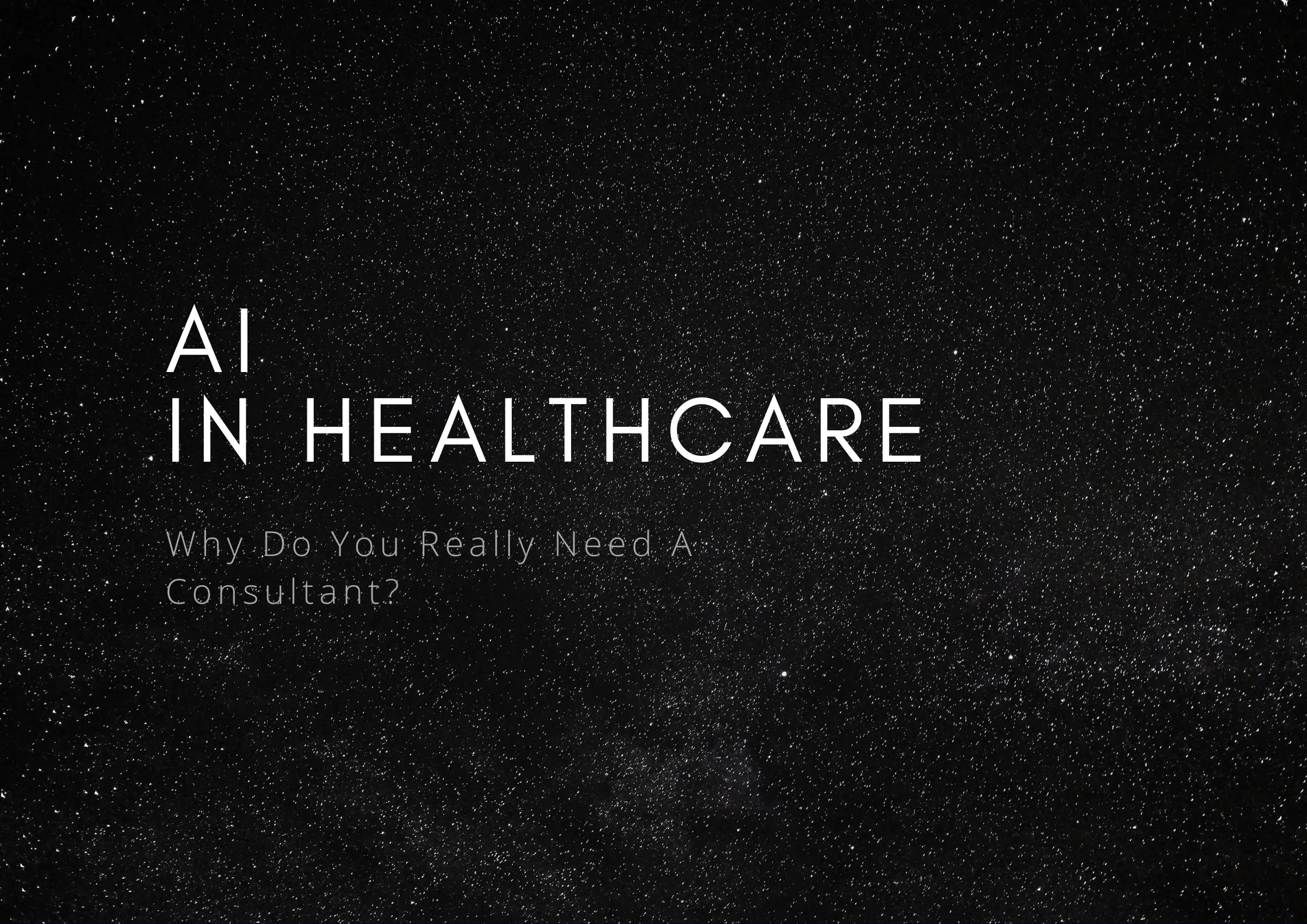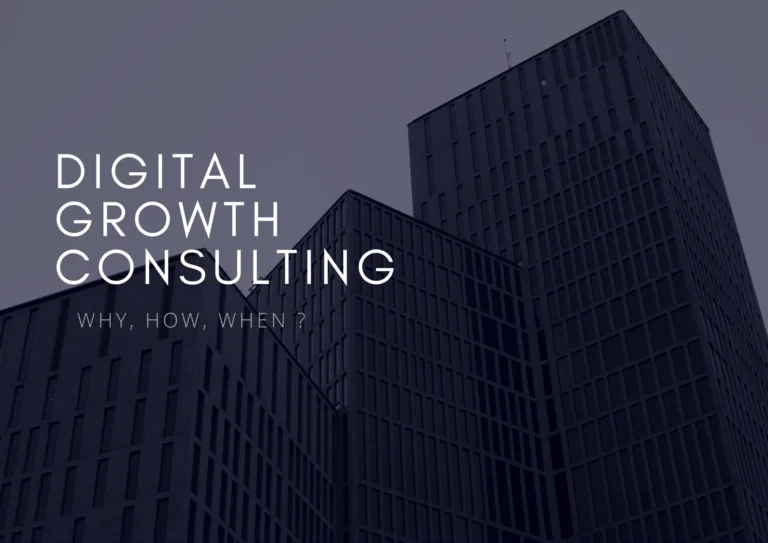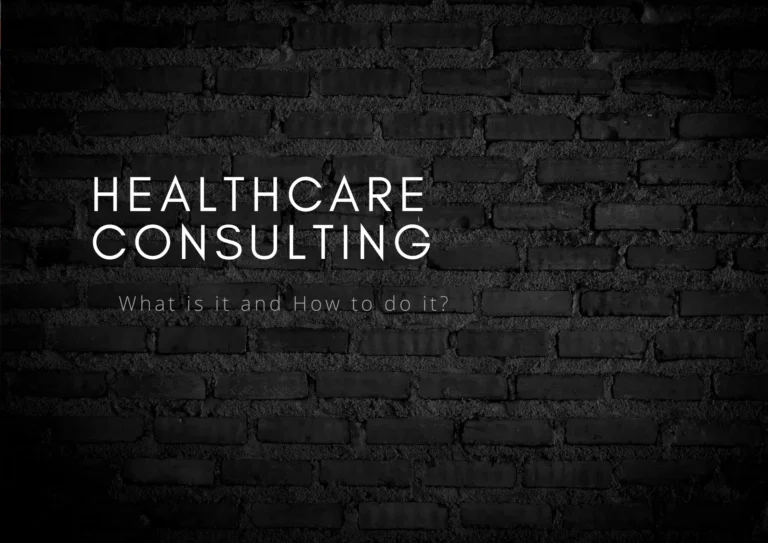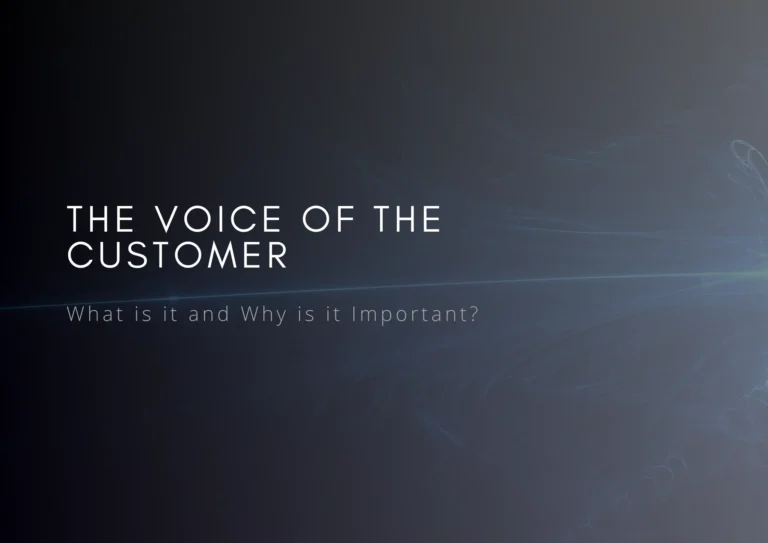Artificial Intelligence (AI) is revolutionizing healthcare, offering unprecedented opportunities to enhance patient care, optimize operations, and improve overall outcomes. However, adopting and integrating AI into healthcare systems is a complex process that requires strategic planning, expertise, and a clear vision. This is where healthcare consultants play a pivotal role, bridging the gap between AI potential and real-world application.
What is AI in Healthcare, and Why Does It Matter?
Artificial Intelligence (AI) in healthcare refers to the use of advanced technologies like machine learning (ML), natural language processing (NLP), and computer vision to mimic human cognitive processes. These technologies analyze complex datasets, learn from patterns, and make predictions to support clinical, operational, and financial decisions in healthcare.
AI is transforming the way healthcare is delivered by:
- Enhancing Diagnostics: AI algorithms are capable of detecting diseases, such as cancers, in their earliest stages, often outperforming human experts in accuracy and speed.
- Streamlining Administrative Workflows: By automating repetitive tasks such as scheduling, medical coding, and claims processing, AI frees up time for healthcare professionals to focus on patient care.
- Personalizing Treatment Plans: AI enables precision medicine by analyzing genetic, environmental, and lifestyle data to design tailored treatments for individual patients.
- Supporting Clinical Decision-Making: AI-powered decision support systems provide evidence-based recommendations to clinicians, reducing errors and improving outcomes.
This revolutionary technology bridges the gap between data overload in healthcare and actionable insights, paving the way for more efficient, accessible, and patient-centric care systems.
The Growing Demand for AI in Healthcare: Key Trends and Statistics
AI is not just a buzzword in healthcare; it is becoming a necessity for organizations aiming to stay competitive. Key drivers of its demand include advancements in data generation, the need for cost reduction, and growing patient expectations for quality care.
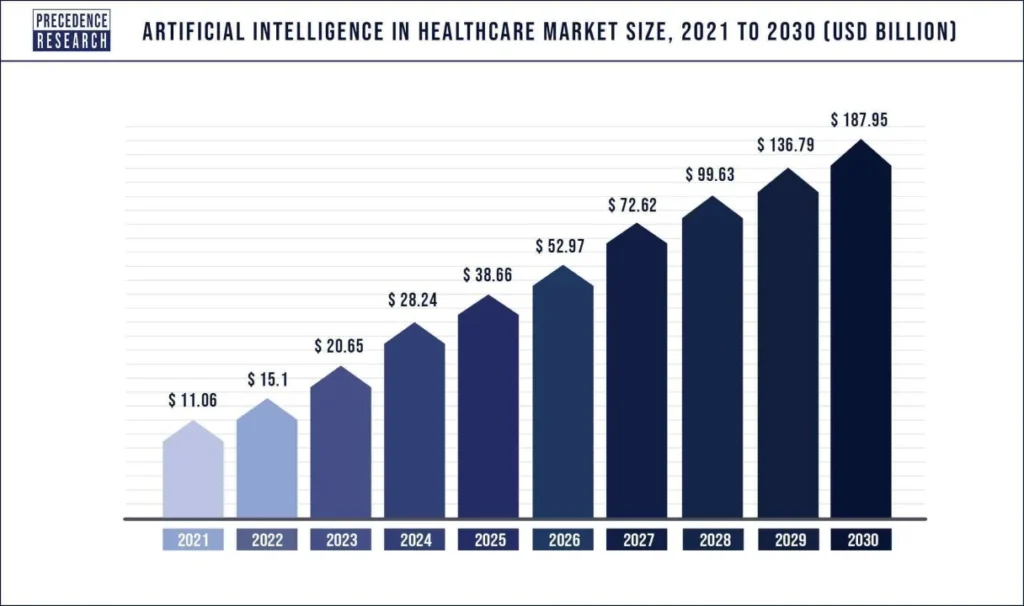
- Market Growth Projections:
The global AI in healthcare market is estimated to grow at a compound annual growth rate (CAGR) of 37.5%, reaching $194.4 billion by 2030. This growth is fueled by increasing investments in AI-driven solutions, government initiatives supporting digital transformation, and the rising prevalence of chronic diseases. - Key Applications of AI in Healthcare:
- Predictive Analytics: AI analyzes patient data to predict disease risks, hospital readmissions, and treatment outcomes. This proactive approach enhances preventive care and resource planning.
- Robotic Surgery: AI-powered robotic systems improve surgical precision, reduce recovery times, and minimize complications. These systems are becoming standard practice in complex surgeries like orthopedics and neurology.
- Personalized Medicine: AI tailors treatments based on individual genetic and clinical profiles, increasing effectiveness and reducing adverse effects.
- Adoption Statistics:
- A survey by Deloitte revealed that 63% of healthcare executives consider AI implementation a high priority in their organizations.
- Hospitals using AI-based systems for diagnostics and operational efficiency have reported up to a 30% reduction in costs and a 20% improvement in patient outcomes.
Barriers to AI Adoption in Healthcare
Despite its promise, the adoption of AI in healthcare faces several challenges:
- Data Privacy and Security: Ensuring compliance with regulations like HIPAA and GDPR is critical, as AI relies on sensitive patient data.
- Interoperability Issues: Integrating AI systems with existing healthcare IT infrastructure remains a technical hurdle.
- Resistance to Change: Many healthcare professionals are hesitant to adopt AI due to concerns about job displacement and trust in technology.
- High Initial Costs: The implementation of AI solutions requires significant investment in technology, training, and infrastructure.
The COVID-19 pandemic accelerated the adoption of AI in healthcare, highlighting its potential to address global health crises. From enabling remote patient monitoring to analyzing infection trends, AI proved to be an indispensable tool. As the world faces ongoing public health challenges, the role of AI in healthcare will only grow in importance.
By harnessing the power of AI, healthcare organizations can improve care delivery, optimize operations, and drive better patient outcomes. For healthcare consultants, this represents an opportunity to lead the charge in integrating AI technologies effectively and ethically.
AI in Healthcare: Real-World Examples
Breakthrough Applications of AI in Diagnostics, Treatments, and Hospital Operations
AI technologies are revolutionizing healthcare through advanced applications that enhance diagnostic accuracy, treatment effectiveness, and operational efficiency. These real-world examples demonstrate how AI is making an impact:
- Diagnostics:
AI algorithms are achieving unprecedented accuracy in diagnosing complex medical conditions.- Breast Cancer Detection: AI systems like Google’s DeepMind and IBM Watson have been shown to outperform radiologists in detecting early signs of breast cancer. By analyzing mammograms, these algorithms reduce false positives and negatives, enabling earlier and more effective treatment.
- Diabetic Retinopathy Screening: AI-powered diagnostic tools like EyeArt have revolutionized screening for diabetic retinopathy, offering quick, non-invasive detection with high accuracy, especially in underserved areas.
- Treatment Planning:
AI assists clinicians in designing personalized treatment plans based on patient-specific data, such as genetic profiles and medical history.- Oncology: AI platforms like Tempus analyze vast datasets to recommend tailored cancer treatments, improving patient outcomes.
- Precision Medicine: AI-driven pharmacogenomics identifies the most effective drug combinations for individual patients, minimizing side effects and maximizing efficacy.
- Hospital Operations:
AI is streamlining administrative processes, optimizing resource allocation, and improving patient flow in hospitals.- Staff Scheduling: AI-driven systems predict staffing needs based on historical data and real-time patient admissions, ensuring adequate coverage while avoiding overstaffing.
- Wait Time Reduction: Hospitals using AI-powered queue management systems have significantly reduced patient wait times by analyzing demand patterns and reallocating resources dynamically.
- Supply Chain Optimization: AI tools track inventory levels and predict supply needs, minimizing wastage and ensuring the availability of critical medical supplies.
- Virtual Health Assistants:
AI-powered virtual assistants, such as Babylon Health and Ada, engage patients with 24/7 access to symptom checkers, medical advice, and appointment scheduling. These tools improve accessibility and reduce the workload for healthcare providers.
Success Stories and Impactful AI in Healthcare Projects
AI’s potential is not just theoretical; numerous successful projects demonstrate its real-world impact:
- Predictive Analytics for Patient Readmissions:
Hospitals leveraging AI for predictive analytics have seen significant improvements in patient outcomes and resource efficiency.- Example: A study at Johns Hopkins Hospital showed that implementing AI-driven predictive models reduced 30-day readmission rates by 20%, saving millions in penalties and improving care continuity.
- Appointment Scheduling with AI Chatbots:
AI chatbots are revolutionizing the way patients interact with healthcare systems.- Example: A leading U.S. health system deployed an AI-powered chatbot for appointment scheduling, achieving a 30% increase in accuracy and reducing no-show rates. This improved operational efficiency and patient satisfaction.
- Robotic Surgery Systems:
Surgical systems like da Vinci use AI to enhance precision and reduce complications during complex procedures.- Example: AI-assisted robotic surgeries at Mayo Clinic resulted in shorter recovery times and fewer post-surgical complications, leading to higher patient satisfaction scores.
- AI in Drug Discovery:
AI is accelerating drug discovery processes, significantly reducing the time and cost involved.- Example: Insilico Medicine, an AI-driven biotech company, successfully identified potential drug candidates for pulmonary fibrosis in under 18 months—a fraction of the traditional timeline.
These real-world applications illustrate the transformative potential of AI in healthcare, from improving patient outcomes to optimizing hospital operations. Consultants play a critical role in identifying opportunities for AI adoption, selecting the right technologies, and ensuring successful integration into existing systems. By showcasing these examples, organizations can better understand the tangible benefits of AI and the importance of strategic planning in its implementation.
AI-Powered Tools and Technologies in Healthcare
AI Solutions Transforming Healthcare Delivery
The rapid advancement of AI-powered tools is reshaping how healthcare is delivered, enhancing clinical precision, operational efficiency, and patient care. Below are some of the most transformative AI technologies driving change:
- IBM Watson Health:
This AI platform provides advanced analytics for clinical decision support. It processes vast amounts of unstructured medical data, offering evidence-based recommendations that aid in diagnosis and treatment planning. For example, Watson Health has been instrumental in oncology, helping physicians tailor cancer therapies based on patient-specific data. - Google’s DeepMind:
DeepMind’s AI technology is revolutionizing areas such as imaging diagnostics and predictive healthcare. Its algorithms have demonstrated groundbreaking accuracy in detecting eye diseases from retinal scans and predicting acute kidney injury up to 48 hours in advance. - AI-Powered Virtual Assistants:
Tools like Microsoft’s Azure Health Bot integrate with healthcare systems to provide symptom checking, appointment scheduling, and medication reminders, significantly improving patient engagement and administrative efficiency.
Exploring AI in Healthcare Through Case Studies and Examples
AI’s capabilities extend to specialized fields, where it’s achieving remarkable results:
- Deep Learning in Dermatology:
AI algorithms trained on large datasets of dermatological images are detecting skin cancer with near-perfect accuracy. Tools like SkinVision are assisting dermatologists by identifying malignant lesions at an early stage, reducing missed diagnoses. - Natural Language Processing (NLP) for Clinical Documentation:
NLP technologies like Nuance Dragon Medical One streamline the documentation process by transcribing physician-patient interactions in real time. This reduces administrative burdens and allows clinicians to focus more on patient care. - Predictive Maintenance for Medical Equipment:
AI tools monitor equipment performance, predicting maintenance needs before failures occur. This ensures uninterrupted care delivery and cost savings.
How Healthcare Consultants Facilitate AI Integration?
AI adoption requires more than just implementing tools; it demands strategic planning, organizational alignment, and overcoming barriers. Healthcare consultants are essential in this journey, ensuring seamless integration and maximizing the benefits of AI technologies.
Strategic Planning for Implementing AI in Healthcare Organizations
Healthcare consultants develop tailored strategies that align AI initiatives with organizational goals and capabilities. Key elements include:
- Roadmap Development: Consultants create step-by-step implementation plans, from selecting AI tools to integrating them into workflows.
- Technology Compatibility: Ensuring that AI solutions can interface with existing IT systems, such as electronic health records (EHR) and hospital information systems (HIS).
- Assessing Organizational Readiness: Consultants evaluate the current infrastructure, staff capabilities, and data quality to determine the organization’s readiness for AI adoption.
Overcoming Barriers: Resistance to Change and Cost Challenges
AI integration often faces resistance from staff and stakeholders, as well as concerns about costs. Consultants play a pivotal role in addressing these challenges:
- Building a Culture of Innovation:
Consultants work closely with leadership to promote AI adoption as a strategic advantage, fostering buy-in across all levels of the organization. They organize workshops and training sessions to ease fears about job displacement and demonstrate AI’s potential to enhance roles rather than replace them. - Providing Training Programs:
Consultants ensure staff members are adequately trained to use AI tools, reducing friction during the adoption phase. This includes hands-on sessions and ongoing support tailored to various roles within the organization. - Identifying Cost-Effective AI Solutions:
AI implementation can be costly, but consultants help organizations select tools that deliver maximum ROI. By focusing on scalable and modular solutions, they enable phased rollouts that minimize financial strain while achieving quick wins. - Tracking Metrics for Success:
To ensure accountability, consultants establish measurable KPIs such as reduced operational costs, improved patient outcomes, and increased staff productivity, showcasing the tangible benefits of AI adoption.
AI-powered tools like IBM Watson Health, DeepMind, and NLP solutions are transforming healthcare delivery, driving better patient outcomes, and streamlining operations. However, the successful integration of these technologies hinges on strategic planning, stakeholder engagement, and overcoming implementation barriers. Healthcare consultants serve as critical enablers, guiding organizations through the complexities of AI adoption to unlock its full potential.
The Role of Consultants in AI-Driven Healthcare Research
Driving Innovation Through AI-Based Healthcare Research Papers
Healthcare consultants are key collaborators in advancing AI-driven healthcare research. Their expertise bridges the gap between cutting-edge AI technologies and practical healthcare applications. Key roles include:
- Supporting Drug Discovery and Development:
AI has transformed drug discovery by significantly reducing the time and cost associated with identifying viable drug candidates. Consultants work with research teams to design and implement AI tools that analyze molecular data, simulate drug interactions, and predict outcomes, accelerating the path to clinical trials. - Enhancing Disease Modeling:
Using AI to simulate disease progression provides insights into effective interventions. Consultants help integrate machine learning models into research initiatives, enabling precise disease predictions and targeted treatment strategies. - Advancing Population Health Research:
AI enables deeper analysis of population health trends by processing vast datasets from EHRs, social determinants, and public health sources. Consultants guide research teams in utilizing AI tools to identify at-risk populations, predict health crises, and design preventive strategies.
Developing Frameworks for Data Collection and Predictive Analytics
High-quality data is the foundation of effective AI-driven research. Healthcare consultants assist organizations in building robust data ecosystems:
- Creating Scalable Data Infrastructure:
Consultants help establish systems for collecting, storing, and managing structured and unstructured data, ensuring scalability for future AI applications. - Ensuring Data Quality:
Poor data quality can hinder AI’s effectiveness. Consultants implement data governance protocols, including cleaning, labeling, and validating datasets to enhance reliability. - Integrating Predictive Analytics Models:
By embedding AI-powered predictive tools into research frameworks, consultants enable real-time insights, supporting proactive decision-making in areas like disease prevention and resource allocation.
Training and Education: Building AI Capabilities in Healthcare
AI adoption in healthcare requires a knowledgeable workforce capable of leveraging new technologies effectively. Healthcare consultants play a critical role in training and education initiatives.
AI in Healthcare Courses: Why Training is Essential for Adoption
Effective training programs are vital to ensure that healthcare professionals understand and use AI tools optimally. Consultants facilitate these programs by:
- Designing Comprehensive Curricula:
Consultants collaborate with educational institutions and industry experts to develop courses that cover AI fundamentals, healthcare-specific applications, and ethical considerations. Topics include machine learning, predictive analytics, and real-world case studies. - Customized Training for Roles:
Programs are tailored for various stakeholders, such as clinicians, administrators, and IT staff, focusing on the specific AI tools they’ll encounter in their roles. - Ensuring Certification Opportunities:
Consultants often recommend and align training programs with recognized certifications like the Certified Artificial Intelligence Practitioner (CAIP) or AI in Healthcare Specialist certifications to enhance credibility and skill validation.
Related Article: How Strategic Management Consulting Drives Organizational Success
Educating Clinicians and Administrators on Leveraging AI Effectively
In addition to formal courses, consultants deliver practical, hands-on training sessions to build AI competency within healthcare teams:
- Workshops and E-Learning Modules:
Interactive workshops and online modules allow professionals to learn at their own pace while gaining practical skills in AI tool usage and troubleshooting. - Simulation-Based Learning:
Consultants use AI simulation tools to train healthcare teams in realistic scenarios, such as diagnosing diseases, managing patient flow, or optimizing treatment plans. - Fostering a Culture of Continuous Learning:
As AI evolves, staying updated is crucial. Consultants implement ongoing learning initiatives, including webinars, knowledge-sharing platforms, and advanced training for emerging AI applications.
Healthcare consultants are instrumental in driving AI-driven research and building AI capabilities in healthcare organizations. By collaborating with research teams, they advance innovations in drug discovery, disease modeling, and population health. Through tailored training programs and educational initiatives, consultants ensure that clinicians and administrators are equipped to integrate AI seamlessly into their workflows, unlocking its transformative potential for the future of healthcare.
AI and Population Health Management
Leveraging AI for Community-Level Health Improvements
AI technologies are transforming population health management by enabling healthcare systems to analyze large datasets, identify at-risk populations, and implement targeted interventions. Key applications include:
- Predictive Modeling: AI predicts disease outbreaks and identifies populations at high risk for chronic illnesses, such as diabetes or hypertension, allowing healthcare providers to take proactive measures.
- Preventive Care Programs: AI supports the development of tailored wellness initiatives, such as vaccination drives or nutrition education campaigns, improving overall community health outcomes.
- Behavioral Health Monitoring: AI tools analyze social determinants of health to address issues like mental health disparities, housing instability, and food insecurity.
Related Articel: Use Of Ansoff Matrix In Go-To-Market GTM Strategy
Addressing Disparities with AI-Powered Healthcare Models
AI has the potential to uncover and mitigate health disparities by analyzing demographic and geographic data. Consultants play a pivotal role in leveraging AI to:
- Develop Equity-Focused Care Models: By analyzing patient demographics and outcomes, consultants help organizations design interventions tailored to underserved communities.
- Improve Accessibility: AI-powered telehealth platforms reduce barriers to care by providing remote consultations for rural or low-income populations.
- Advocate for Policy Changes: AI insights can influence healthcare policies by highlighting disparities and guiding equitable resource allocation.
Building AI-Driven Healthcare Systems in Emerging Markets
Emerging markets face unique healthcare challenges, including inadequate infrastructure and limited access to care. AI offers solutions that bridge these gaps:
- Affordable Diagnostic Tools: AI-driven devices provide cost-effective diagnostic solutions for diseases like tuberculosis and malaria, often prevalent in developing regions.
- Telemedicine Solutions: AI-powered telehealth platforms overcome geographical barriers, connecting patients with specialists in urban centers.
- Scalable Health Systems: AI helps manage healthcare systems by predicting demand for services, optimizing supply chains, and enhancing workforce allocation.
Tailoring AI Projects for Localized Healthcare Challenges
Healthcare consultants are essential in adapting AI technologies to suit local needs:
- Language and Cultural Sensitivity: Consultants integrate AI tools with multilingual capabilities and culturally relevant healthcare practices.
- Resource Optimization: In regions with limited infrastructure, consultants identify scalable AI solutions that maximize impact with minimal resources.
- Collaborating with Local Stakeholders: Consultants work with governments, NGOs, and local healthcare providers to ensure AI projects align with regional priorities.
The Future of AI in Healthcare: Consultant’s Perspective
Trends to Watch: AI in Preventive Care and Personalized Medicine
- AI in Genomics: AI is enabling highly personalized treatments by analyzing genetic data to identify the most effective therapies for individual patients. This is particularly impactful in oncology and rare diseases.
- Predictive Analytics in Preventive Care: By analyzing patient history and lifestyle factors, AI predicts the onset of chronic diseases, allowing for early intervention and reduced disease burden.
Long-Term Impact of AI on Healthcare Systems Globally
AI is set to transform healthcare systems by:
- Enhancing Efficiency: Automated workflows and predictive tools reduce administrative workloads and optimize operations.
- Promoting Patient-Centered Care: AI enables tailored treatment plans and real-time monitoring, improving patient satisfaction and outcomes.
- Reducing Costs and Increasing Accessibility: AI tools lower the cost of diagnostics and care delivery, making quality healthcare more accessible, especially in underserved regions.
Case Studies: Transforming Healthcare with AI Projects
Detailed Look at Successful AI in Healthcare Projects
- AI-Driven ICU Monitoring Systems: Advanced AI algorithms used in ICU settings reduced patient mortality rates by 18% by detecting complications earlier and assisting clinicians in decision-making.
- AI Triage Tools: A major health network implemented an AI-powered triage system that reduced patient wait times and improved throughput by 25%, enhancing overall efficiency.
Lessons Learned from Integrating AI into Healthcare Workflows
- Robust Change Management Strategies: Successful adoption of AI requires leadership engagement, staff training, and clear communication of its value.
- Continuous Feedback and Iteration: Post-implementation, organizations must collect feedback from users to refine AI tools, ensuring they remain effective and user-friendly.
Measuring the Impact of AI in Healthcare
Evaluating the Success of AI Integration with Metrics Like ROI and Patient Outcomes
Healthcare consultants play a critical role in assessing the impact of AI projects by tracking:
- Financial Returns: Reduced costs from operational efficiency and better resource utilization.
- Patient Satisfaction Scores: Improved accessibility, shorter wait times, and personalized care contribute to higher satisfaction levels.
- Clinical Effectiveness: Metrics such as diagnostic accuracy, treatment success rates, and reduced readmissions are evaluated to measure clinical impact.
How AI Improves Operational Efficiency, Cost Reduction, and Care Quality
- Operational Efficiency: AI automates administrative tasks, like billing and documentation, freeing up staff to focus on patient care.
- Cost Reduction: Predictive analytics help optimize resource allocation, reducing waste and unnecessary expenditures.
- Care Quality: Enhanced diagnostic capabilities and real-time monitoring enable earlier interventions, leading to better outcomes and reduced complications.
Take-home Message
The integration of AI into healthcare is a transformative journey, one that requires strategic planning, innovation, and collaboration. From addressing disparities and improving population health to driving innovation in emerging markets, AI’s potential is limitless. Consultants play a vital role in guiding organizations through this evolution, ensuring successful adoption and delivering measurable results. With AI at the forefront, healthcare is poised for a future of unparalleled efficiency, accessibility, and quality.

